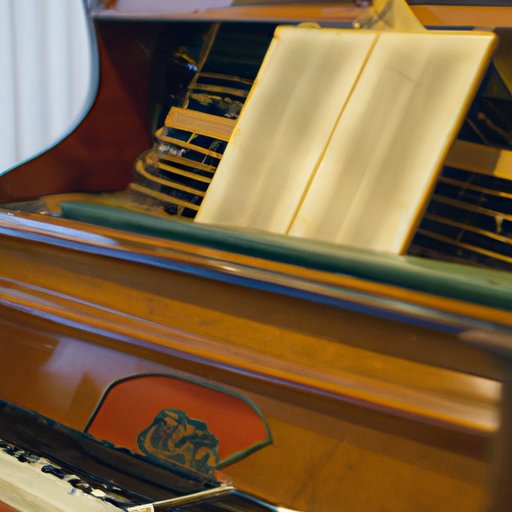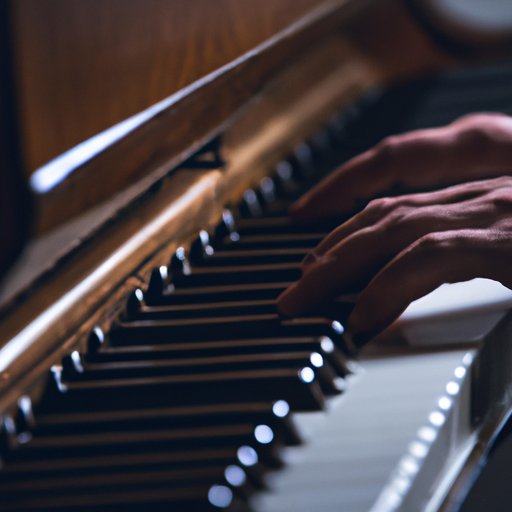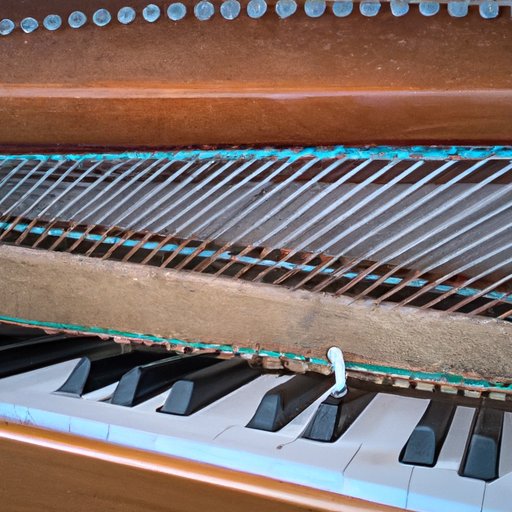Introduction
The piano is a beloved instrument that has been used to create beautiful music for centuries. It is a stringed instrument with a keyboard, which is used to produce sound by striking strings with small hammers. The piano is one of the most popular instruments in the world, and its influence can be seen in many different genres of music. This article will explore the history of the invention of the piano, its cultural and musical impact, and the technological advancements that enabled its creation.

A Historical Overview of the Invention of the Piano
The origins of the piano can be traced back to the early 1700s, when Italian harpsichord maker Bartolomeo Cristofori began experimenting with keyboard instruments. He wanted to create an instrument that could play both loud and soft tones, something that existing keyboard instruments at the time could not do. By 1709, he had created what we now know as the modern piano. He called his invention “gravicembalo col piano e forte” (“harpsichord with soft and loud”).
Cristofori’s invention was revolutionary, but it took some time for it to become widely accepted. In the late 1700s, further improvements were made to the instrument, such as the addition of pedals and metal frames. These advancements helped the piano become more popular, and it quickly gained traction in Europe and North America. By the mid-1800s, the modern piano had become the dominant keyboard instrument.

Examining the Musical and Cultural Impact of the Piano
The invention of the piano had a profound effect on music and culture. It allowed musicians to express themselves in new and creative ways, and it opened up a whole new world of possibilities. The piano has had a major influence on many different musical styles and genres, from classical to jazz, rock, pop, and beyond.
The piano has also shaped popular culture in many ways. It has been featured prominently in films, television shows, and other forms of media, and it has become an iconic symbol of sophistication and elegance. The piano has inspired countless songs, and it is still used today to create beautiful and emotive music.

Exploring the Technological Advancements That Enabled the Creation of the Piano
The invention of the piano was only possible because of the technological advancements of the time. Early keyboard instruments, such as the clavichord and harpsichord, served as the inspiration for the modern piano. These instruments had limited dynamic range, meaning they could not produce loud and soft tones at the same time. Cristofori’s invention solved this problem by using a hammer mechanism, which allowed for dynamic control of the instrument’s sound.
Modern technology has also played a role in the development of the piano. Today, digital and electronic pianos are available, which allow for greater flexibility and control over the instrument’s sound. Advances in technology have also made it easier to record and produce piano music, allowing the instrument to reach a wider audience.
Investigating the Inventors Who Developed the Piano
Bartolomeo Cristofori is widely considered to be the inventor of the modern piano, but he was not the only one responsible for its development. Several other inventors and engineers worked on improving the instrument over the years, including Gottfried Silbermann, Johannes Zumpe, and Johann Andreas Stein. Each of these inventors contributed to the evolution of the piano and helped shape it into the instrument we know today.
Cristofori is often referred to as the “father of the piano,” and his work laid the foundation for the modern instrument. His invention revolutionized keyboard instruments, and it has had a lasting impact on music and culture.
Analyzing the Influence of the Piano on Music Genres Over Time
The piano has had a major influence on many different music genres over the years. Classical music, in particular, is closely associated with the piano, and many of the most famous composers wrote works specifically for the instrument. Beethoven, Mozart, Bach, and Chopin are just a few of the many composers who wrote music for the piano.
The piano has also been an important part of jazz, rock, and pop music. Jazz musicians such as Bill Evans and Oscar Peterson used the instrument to create complex and emotive solos, while rock and pop artists like Elton John and Billy Joel incorporated the piano into their songs. The piano is still a staple of modern music, and it continues to inspire musicians to create beautiful and innovative music.
Conclusion
The invention of the piano has had a major impact on music and culture. From its origins in early 1700s Italy to its influence on modern music, the piano has been a beloved instrument for centuries. It has helped shape many different musical styles and genres, and it has become an iconic symbol of sophistication and elegance. The piano is a testament to the power of technology, and it continues to inspire musicians to create beautiful and emotive music.
(Note: Is this article not meeting your expectations? Do you have knowledge or insights to share? Unlock new opportunities and expand your reach by joining our authors team. Click Registration to join us and share your expertise with our readers.)
